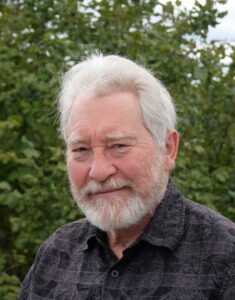‘Crow-cracked kra coughed crackle’? Read on
The Salmon Shanties: A Cascadian Cycle
by Harold Rhenisch
Regina: U Regina Press, 2024
$19.95 / 978177940154
Reviewed by Steven Ross Smith
*

Harold Rhenisch sings. Syllables and words, ideas and images, crest and densify in a rich and relentless tumble. Lines are full, fluid, rhythmic, and sounded, often with incantatory tone–the poetic plate is expansive, lyrical, and vibrant–leaping, image to image–yet the melodic momentum demands pause, to reflect on multiplicities, that may amplify, or contrast, or shift.
The full title of Rhenisch’s book, his 33rd, is The Salmon Shanties: A Cascadian Cycle. Cascadia is–as Wikipedia reminds me–a bioregion that encompasses the Pacific Northwest, the entire watershed of the Columbia River, the Fraser River, as well as the Cascade Range, from Northern California well into Canada. Rhenisch travels and carries this realm through forty-one songs, with attention to stewardship–to its ecology, geography, cultures, and history–dwelling in past and present–with awareness and respect, his observations bestowed and expressed through astonishing and generous poetic skills.
From “Cascadian Seduction Zone Tanse,” here’s nature talking: “clicking pebble’s raw craw into a rumble of water cracking rock, but a back / eddy bearing the grumbled Pacific’s mangled and muddled rum.” Here’s the domestic: “Let’s talk to women about what matters: Bannock recipes // and putting something into the mouths or our peep-peep-peeping // children, / even dragging them by the scruff of their ying yangs…”

Rhenisch’s words and lines and images are reaches–embracing existence in the natural world, reaching to explode and explore moments wherein birds skitter, fish fin and snout, four-legged creatures romp and stalk, and sky’s volumes are alive, scrolling and rolling … his reach describes and enters the moment’s beingness, as in “Round for the Mind of the World”: “some of us spirit and some of us dwelling in bodies, but all of us living.” And further to the spirit, the natural world, and the eternal, here, from “A Whistle for the Dead”: “I met the owl again in the winter, when she was so white she flew / out of the air, so close that the woman I have given my life to / did not see her at all. I do believe it’s the dead talking.”
Through these songs, Rhenisch choirs us. The verses are dense and rich, written in long lines, and mostly as couplets, but there is little that is predictable in the unfolding of his text. Lines are voluptuous, sensual, sensory. So many notes sing here–too many to capture in review format–exaltation, mourning, grief, sorrow, and praise–intimate and cosmic–all intermingled in verse full of surprises, contrasting and startling, that stir emotional responses and shifts, moment to moment.
While much of the text revels–offering original, resplendent, often exotic descriptions of the natural world, a stewardship consciousness and a biting cultural critique emerges, as in “Weightless Shanty”: “Now people who stepped out of TV screens are running the world, […] and the work of a man’s hands is now owned by Monsanto, // or that glyphosate’s salty crystals in your gut give you cancer.”
Rhenisch does not stop there in his wry observances and unsettling leaps: from “Shotgun Shanty”: “Now Homer Simpson runs the poetic committees and Big Bird / the departments of philosophy, not the sandhill cranes / stitching the world together in the oldest of stories.” And, as in “Cascadian Reel,” he stitches in biographical notes: “soon enough I returned to the Quakers, Terry skipped to the / Skeena barricades, // the university went back to drinking itself, / and stars swung sorrowfully through the branches overhead.”
It occurs to me that, in his Shanties, Vernon resident Rhenisch (The Tree Whisperer) is embracing the whole world–existence–the universe, all of time, politics, religion, society, and nature and art, and language and poetry. This comes to me on reading “Bella Ciao Shanty.” Where swallows weave and “blackbirds are chirring,” and Ezra Pound and Marxism are invoked, along with Rilke’s grave and Roman wine; where women’s labour and industrialism are referenced, and Caesar and Tiberius, and colonialism: “…the way the circlet / of traffic at the heart of London before the wars / spreads out to the twin hearts of the world, // … remaking it into its own image.” Yet Nature persists, “an old thing, abandoned, and broken: a garden but not of human fashioning.” Rhenisch jam-packs his songs with ideas, zooming and spanning, yet with the grace of a skilled composer; a song might jar and rattle while at the same time carry a croon that compels. A reader cannot help but be swept and stilled simultaneously in the lyric experience.
The vocabulary is peppered with geographic labels and locales, notions often expressed in original Indigenous or derivative terms. A helpful glossary end note describes strange words–the “Chinook Wawa”–a “language of trade and diplomacy in the Northwest Coast of North America […] a blend of Nuu-chah-nulth, Tsinuk, English, Hawaiian, and French” languages. Additional end notes provide insights into terms and background references to the poems’ contents. These are helpful and appreciated, but not always essential to the experience of the poems.
One proceeds through the pages, through the contrasts of ache and beauty of all that Rhenisch captures, to the sonic ending of the penultimate poem: “crow-cracked kra coughed crackle,” and then to the dark, terrifying lament of “Eternity Shanty: coda,” its environmental message from an angry, penitent, protesting “citizen of the oil state,” this poet of rare and raw–yet refined–power, singing with and against the natural and the manmade tides.
[Editor’s note: Harold Rhenisch will read at “The Studio” (373 Okaview Road, Kelowna) at 3:00 pm, Sunday, November 10.]

*

Steven Ross Smith, Banff Poet Laureate 2018-21, loves live music and walking on beaches and in forests. His poetic work, created over four decades, often juxtaposes disparate threads, as in his seven-book series fluttertongue. His fourteenth book is Glimmer: Short Fictions. Three collaborative chapbooks have appeared with Jackpine Press; and The Green Rose, a collaboration with Phil Hall, is recent from above/ground press. Over many years Smith has migrated westward from Toronto to Saskatoon to Banff, and he now lives and writes in the region of the W̱SÁNEĆ peoples, Victoria, BC. [Editor’s note: Smith recently reviewed Kevin Spenst, Eimear Laffan, and Tim Lilburn for BCR.]
*
The British Columbia Review
Interim Editors, 2023-25: Trevor Marc Hughes (non-fiction), Brett Josef Grubisic (fiction and poetry)
Publisher: Richard Mackie
Formerly The Ormsby Review, The British Columbia Review is an online book review and journal service for BC writers and readers. The Advisory Board now consists of Jean Barman, Wade Davis, Robin Fisher, Barry Gough, Hugh Johnston, Kathy Mezei, Patricia Roy, and Graeme Wynn. Provincial Government Patron (since September 2018): Creative BC. Honorary Patron: Yosef Wosk. Scholarly Patron: SFU Graduate Liberal Studies. The British Columbia Review was founded in 2016 by Richard Mackie and Alan Twigg.
“Only connect.” – E.M. Forster
4 comments on “‘Crow-cracked kra coughed crackle’? Read on”
I love this. I have the book on order and can’t wait to read it.
A splendid review. Warm congratulations
What a marvellous review of a very great poet!